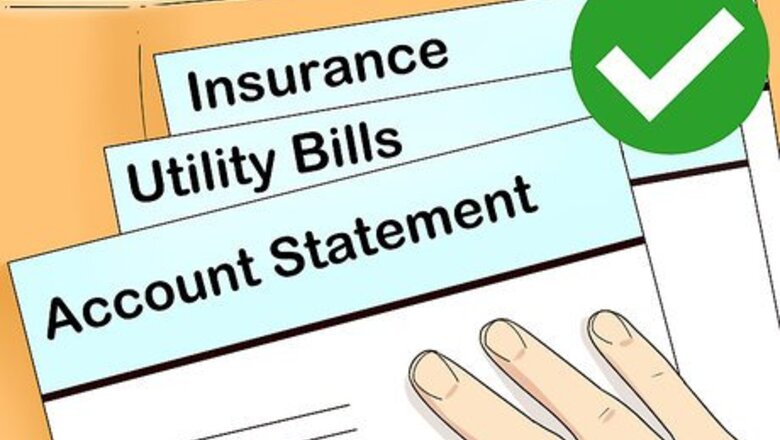
views
X
Trustworthy Source
United States Department of Justice
Official website of the U.S. Department of Justice
Go to source
Reporting Financial Fraud
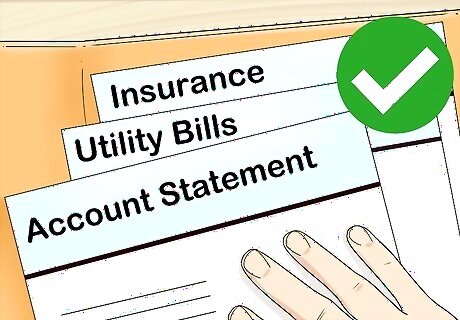
Gather information about the fraud. Before you start your report, make sure all the information or evidence you have is at hand and readily available. Make copies of any original documents so you can send the copy and retain the original unless instructed otherwise. If you're filing a report online, you will want to make digital copies of your documents, which may include scanning the original document or taking screen shots. Information or documents that might be useful to investigators include any emails or letters you've received related to the fraudulent activity, bills, and account statements.
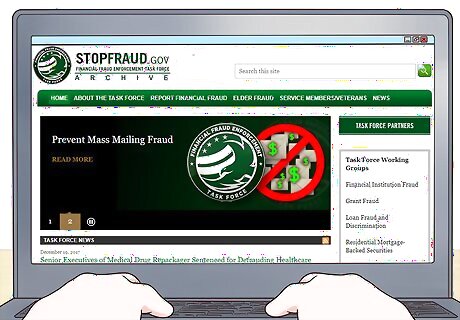
Visit the stopfraud.gov website. The website is run by the federal government's Financial Fraud Enforcement Task Force, which coordinates efforts of several federal law enforcement agencies including the FBI to combat financial fraud. The task force was created in November 2009 in the wake of the financial crisis, and aims to investigate and prosecute financial crimes across all sectors and financial markets. While you may think of crimes such as identity theft and credit card fraud, financial fraud also encompasses corporate fraud, predatory lending, securities fraud, procurement and insurance fraud, and other types of illegal financial activities.
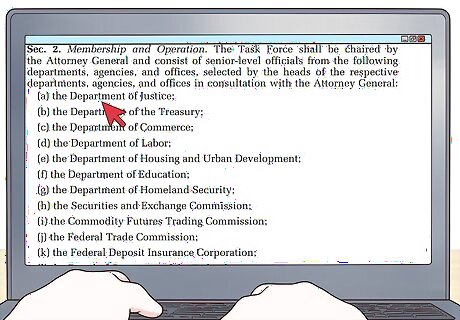
Categorize the type of fraud you want to report. After you click on the tab to report fraud, you will find a list of a number of different types of financial fraud handled by different federal agencies. The task force includes more than 20 federal agencies, U.S. attorney's offices, and various state and local law enforcement agencies, and has a broad mission. In many cases the situation you want to report may fall under more than one category. For example, if someone attempts to steal your credit card or bank account information online, this could constitute identity theft as well as computer-based fraud or cyber crime. If the incident you want to report falls under more than one category, you should consider reporting the fraud under both categories. Different agencies may be involved depending on the subject matter of your report.

Follow the instructions provided at the link. Clicking on the type of fraud you want to report will take you to a listing that gives you the specific agency to which that type of fraud must be reported along with the agency's website, telephone hotline, and other contact information. The website directs you to the agency where you should report that particular type of financial fraud, which may or may not be the FBI. Keep in mind that while the FBI does have a hand in investigating all types of fraud, certain agencies may be better situated to investigate fraud in specific areas. For example, mail fraud typically should be first reported to the U.S. Postal Inspection Service rather than to the FBI, even though the FBI may become involved at some stage of the investigation. In contrast, mortgage fraud and loan scams may be first reported to the FBI by calling the FBI tip line at 1-700-225-5324 or submitting the online tip form. However, you also may want to submit a complaint or other information to the Housing and Urban Development Office of the Inspector General.
Reporting Disaster-Related Fraud and Public Corruption

Learn how to recognize disaster-related fraud. Disaster-related fraud may include insurance fraud or public benefits fraud, and the perpetrators may include individuals or business contractors involved in disaster recovery. The Disaster Fraud Task Force was initially established to deal with fraud occurring in the wake of the Hurricane Katrina disaster. As additional natural disasters occurred, the task force became involved with safeguarding the disaster relief efforts in those contexts as well. Disaster-related fraud deals with individuals and businesses that attempt to extort or manipulate innocent victims and government agencies to illegally profit off of the generosity of those trying to help victims of natural disasters. For example, individuals may hold themselves out as representatives of a legitimate charity to take money for themselves that people donate to help natural disaster victims, or may create a fraudulent charity that takes donations and does nothing for the people it purports to help. In other cases, people may file fake or inflated insurance claims in an attempt to get more money than they are rightfully owed as a result of a natural disaster. Keep in mind that many of these types of fraud, especially insurance fraud, cost everyone money in the form of higher insurance costs and increased costs to recover and rebuild areas destroyed by natural disasters.
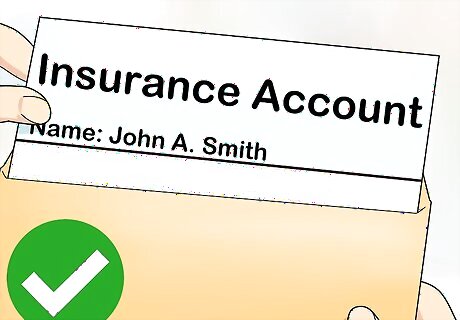
Gather information about the fraud you want to report. Before you file your report, have copies available of any documents or other materials that provide evidence of the fraudulent activity. If you are a third-party witness to the activity, it may be difficult to get your hands on any actual documents or proof that the fraud is occurring. However, any information you have can be used by the task force to track down the perpetrators.
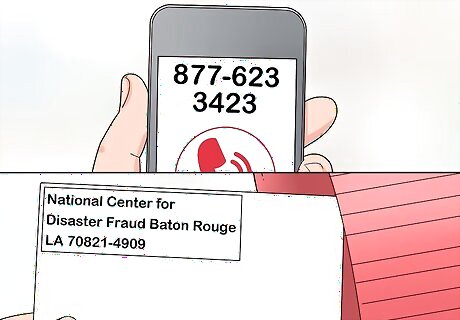
Contact the Disaster Fraud Task Force. The federal government operates a Disaster Fraud Task Force which coordinates the efforts of several different government agencies involved in disaster relief with law enforcement agencies such as the FBI. There is no specific form to use to report disaster-related fraud, but you still can let the task force know about the activity. You can call 877-623-3423, fax information to 225-34-4707, or email [email protected]. If you would prefer to mail a written report, you can send it to National Center for Disaster Fraud, Baton Rouge, LA 70821-4909.

Provide your own contact information with your report. Giving investigators the means to contact you ensures that they can conduct a thorough investigation and follow up if they have any questions. Although you may prefer to remain anonymous, including contact information can greatly assist the task force in verifying and substantiating your claims.
Reporting Internet-Related Fraud

Collect information about the fraud. Before you begin the online complaint process, take the time to pull together information and copies of evidence you have about the crime. The more information and detail you can provide, the more likely it will be that the crime will be investigated and the perpetrators eventually brought to justice. However, you shouldn't hold off reporting fraud simply because you don't think you have a lot of information. Any documents or other information you have typically can be attached to your complaint as a digital file. Make sure you convert any such items to digital format, such as by scanning them, before you start your complaint.
Visit the Internet Crime Complaint Center (IC3) website. The FBI runs a website that collects information on internet crime to be disseminated and analyzed by the FBI and other federal, state, and local law enforcement agencies. You can submit a complaint about online fraud whether you are the victim of the fraud or a third party with information about the fraudulent activity. Keep in mind that the IC3 program only evaluates crimes that take place over the internet, so if you observed fraudulent activity in person, the website may not be the best place to file your complaint. However, IC3 staff may evaluate any complaint of fraud that has a web-based component, even if aspects of the crime occurred offline.
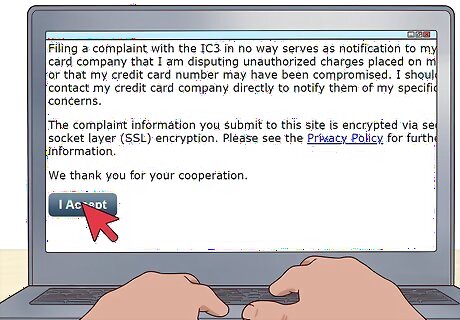
Accept the privacy policy. You must agree to the FBI's terms and conditions, as well as understand how your information will be kept secure, before you can proceed with filling out the IC3 complaint form. Any information you submit must be true and correct to the best of your knowledge. If you knowingly and intentionally provide false information, you could be subject to penalties for perjury including fines and jail time. Once your information is received by the IC3, it will be evaluated and shared with the appropriate agencies depending on the character of the activity you've reported. Although IC3 may share information with federal, state, or even international law enforcement agencies, the individual agencies retain discretion regarding whether to follow up on your complaint or initiate any investigation.
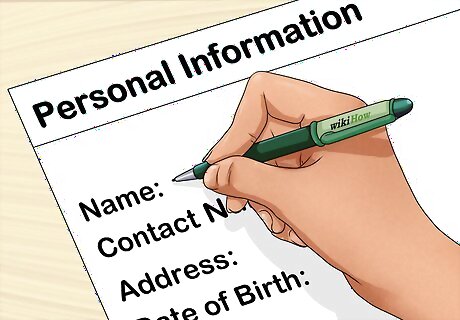
Enter your information. The complaint form requires you to provide your own name and contact information, as well as factual details about the crime you want to report. Providing an accurate name and contact information is important so investigators can contact you if they have further questions or need more details about the activity. You should provide as many details and specifics as you know or can recall. It's important to maintain a high level of accuracy, but at the same time include as much information as possible. Avoid making judgment calls regarding what information is important and what isn't. A fact that may seem inconsequential to you could be evidence of a similar method that unlocks a pattern consistent in several other cases about which you're unaware.
Submit your complaint. Once you've reviewed your complaint and are satisfied that the information you've provided is correct and complete, you can click the button to submit it to IC3 for evaluation. When your complaint is complete, make sure you download or print a copy of it for your own records, so you'll know what you submitted if an investigator contacts you to follow up. You'll get an email that confirms receipt of your complaint and assigns you a username and password to access your complaint at any time. After you've submitted your complaint, it can't be deleted or withdrawn. However, you have the ability to add information to it if anything else happens regarding the fraudulent activity, or if you learn any new details.











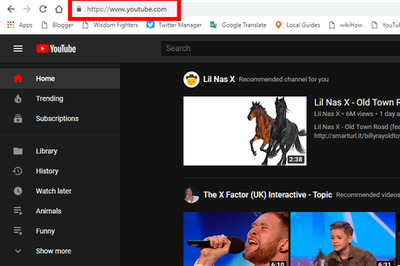








Comments
0 comment